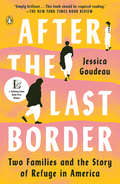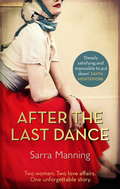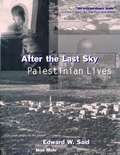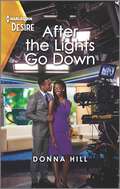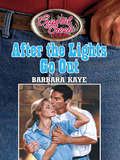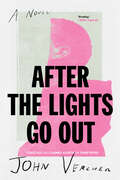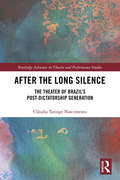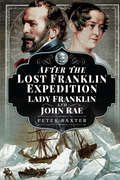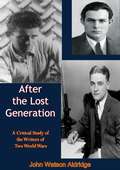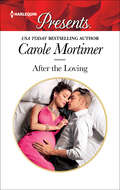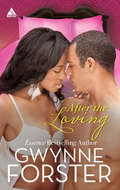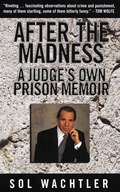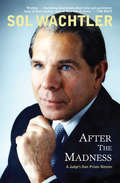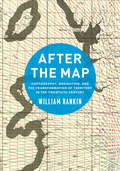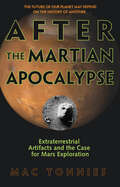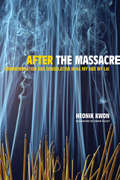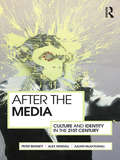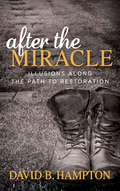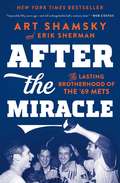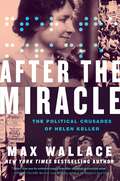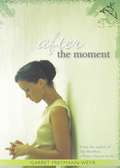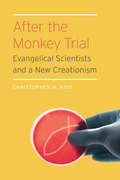- Table View
- List View
After the Last Border: Two Families and the Story of Refuge in America
by Jessica GoudeauThe story of two refugee families and their hope and resilience as they fight to survive and belong in AmericaThe welcoming and acceptance of immigrants and refugees has been central to America's identity for centuries--yet America has periodically turned its back at the times of greatest humanitarian need. After the Last Border is an intimate look at the lives of two women as they struggle for the twenty-first century American dream, having won the "golden ticket" to settle as refugees in Austin, Texas.Mu Naw, a Christian from Myanmar struggling to put down roots with her family, was accepted after decades in a refugee camp at a time when America was at its most open to displaced families; and Hasna, a Muslim from Syria, agrees to relocate as a last resort for the safety of her family--only to be cruelly separated from her children by a sudden ban on refugees from Muslim countries. Writer and activist Jessica Goudeau tracks the human impacts of America's ever-shifting refugee policy as both women narrowly escape from their home countries and begin the arduous but lifesaving process of resettling in Austin, Texas--a city that would show them the best and worst of what America has to offer.After the Last Border situates a dramatic, character-driven story within a larger history--the evolution of modern refugee resettlement in the United States, beginning with World War II and ending with current closed-door policies--revealing not just how America's changing attitudes toward refugees has influenced policies and laws, but also the profound effect on human lives.
After the Last Dance: Two women. Two love affairs. One unforgettable story
by Sarra Manning'Deeply satisfying and impossible to put down' Santa Montefiore'Fascinating . . . a gripping story of love and war' Rachel Hore'An absorbing, unconventional love story' Woman & Home'Highly absorbing and atmospheric' StylistAfter the Last Dance is an extraordinary and vivid story of two women, separated by time but connected by fate, that will make you believe in the redemptive power of unexpected love. Perfect for readers of Rachel Hore, Kathryn Hughes and Tasmina Perry. Kings Cross station, 1943. Rose arrives in London hoping to swap the drudgery of wartime for romance, glamour and jiving with GIs at Rainbow Corner, the famous dance hall in Piccadilly Circus. As the bombs fall, Rose loses her heart to a pilot but will lose so much more before the war has done its worst.Las Vegas, present day. A beautiful woman in a wedding dress walks into a seedy bar and asks the first man she sees to marry her. When Leo slips the ring onto Jane's finger, he has no idea that his new wife will stop at nothing to get what she wants.So when Jane meets Rose, now a formidable older lady, there's no love lost between them. But with time running out, can Rose and Jane come together to make peace with the tragic secrets that have always haunted their lives?* SARRA'S NEXT NOVEL, THE HOUSE OF SECRETS, IS AVAILABLE IN EBOOK NOW. PRE-ORDER THE PAPERBACK - OUT AUGUST 10TH. *
After the Last Sky: Palestinian Lives
by Edward W. Said Jean MohrA searing portrait of Palestinian life and identity that is at once an exploration of Edward Said's unclaimable past and a testimony to the lives of those living in exile.
After the Layoffs, What Next? (HBR Case Study and Commentary)
by Richard Manning Gun Denhart Suzy Wetlaufer Jim Emshoff Saul Gellerman Bob PeixottoHarry Denton, the CEO in this fictional case study, has been caught off guard. As the head of Delarks, a venerable department-store chain in the Midwest, he has engineered a remarkable turnaround in only a year. Sales have rebounded, and Wall Street is applauding. But when Delarks's head of merchandising defects to a competitor, Denton is shocked to realize that many of the layoff survivors, in fact, have had it with him and with the company. The last straw was the recent closing of the Madison store, which Denton announced without warning to anyone--not even the company's head of HR, Thomas Wazinsky, a supposedly trusted adviser. The rumor mill says that many employees are considering leaving before Denton can inflict the next blow. And senior managers are not immune to the fear and anger. Even Wazinsky, one of the few links to Delarks's proud past, confesses to Denton, "I'll bet you're thinking of firing me." Denton has to act--and fast. He calls a "town meeting" for the 600 employees of the St. Paul store. The plan: rally the troops. Instead, Denton is routed. Angry questions are hurled at the CEO, and he is forced to beat a hasty retreat through the back door. In 98510A and 98510Z, Bob Peixotto, Jim Emshoff, Richard Manning, Gun Denhart, and Saul Gellerman offer advice on how to revive morale at the successful but troubled company.
After the Lights Go Down: A Workplace Reunion Romance
by Donna HillAll is fair in love and war…and television morning shows! Two headstrong news anchors collide at the desk and in the bedroom in Donna Hill&’s latest!Two news anchors. One job.And a passion that won&’t be denied… It&’s lights, camera, scandal when competing morning show anchors Layne Davis and Paul Waverly set their sights on the same promotion. Yet sizzling looks and smoking hot kisses are proving more distracting than the competition itself. Paul has always been the object of Layne&’s desires, and now&’s her chance to close the deal. But will a future with Paul mean sacrificing her dream of having both a successful career and love?From Harlequin Desire: A luxurious world of bold encounters and sizzling chemistry.
After the Lights Go Out
by Barbara KayeHOSPITALITY -- TEXAS STYLE! Crystal Creek. . . where power and influence live in the land, and in the hands of one family determined to nourish old Texas fortunes and to forge new Texas futures. TROUBLE'S BREWIN' Jealousy was the last thing Scott Harris expected to feel. Especially over an employee. But one of he guests at the Hole in the Wall Dude Ranch is showing an unusual interest in his ranch manager, Valerie Drayton, and Scott doesn't like it one bit. Trouble is, Val seems determined to stick to Scott's own rule--no fraternizing with the boss.
After the Lights Go Out
by John VercherA harrowing and spellbinding story about family, the complications of mixed-race relationships, misplaced loyalties, and the price athletes pay to entertain—from the critically acclaimed author of Three-Fifths Xavier &“Scarecrow&” Wallace, a mixed-race MMA fighter on the wrong side of thirty, is facing the fight of his life. Xavier can no longer deny he is losing his battle with chronic traumatic encephalopathy (CTE), or pugilistic dementia. Through the fog of memory loss, migraines, and paranoia, Xavier does his best to stay in shape by training at the Philadelphia gym owned by his cousin-cum-manager, Shot, a retired champion boxer to whom Xavier owes an unpayable debt.Xavier makes ends meet while he waits for the call that will reinstate him after a year-long suspension by teaching youth classes at Shot&’s gym and by living rent-free in the house of his white father, whom Xavier was forced to commit to a nursing home. The progress of Sam Wallace&’s end-stage Alzheimer&’s has revealed his latent racism, and Xavier finally gains insight into why his Black mother left the family years ago. Then Xavier is offered a chance at redemption: a last-minute high-profile comeback fight. If he can get himself back in the game, he&’ll be able to clear his name and begin to pay off Shot. With his memory in shreds and his life crumbling around him, can Xavier hold on to the focus he needs to survive? John Vercher, author of the Edgar and Anthony Award–nominated Three-Fifths, offers a gripping, psychologically astute, and explosive tour de force about race, entertainment, and healthcare in America, and about one man&’s battle against himself.
After the Long Silence: The Theater of Brazil’s Post-Dictatorship Generation (Routledge Advances in Theatre & Performance Studies)
by Claudia Tatinge NascimentoAfter the Long Silence offers a ground-breaking, meticulously researched criticism of Brazilian contemporary performance created by its post-dictatorship generation, whose work expresses the consequences of decades of state-imposed censorship. By offering an in-depth examination of key artists and their works, Cláudia Tatinge Nascimento highlights Brazil’s political trajectory while never allowing the weight of historical events to offset key aesthetic trends. Brazilian theater artists born around the time of the nation’s 1964 military coup experienced the oppressive rule of dictatorship throughout their formative years, but came of age as Brazil re-entered democracy some two decades later. This book showcases how the post-dictatorship generation developed performances that mapped the uncharted territories of Brazil’s political trauma with new dramaturgies, site-specific and street productions, and aesthetic experimentation. The author’s in-depth research into a wide array of archival materials and publications in both Portuguese and English demonstrates how the artistic practices of significant post-dictatorship artists such as Cia. dos Atores, Teatro da Vertigem, Grupo Galpão, Os Fofos Encenam, and Newton Moreno were driven by critical thinking and a postcolonial sentiment, proving symptomatic of the nation’s shift from an ethos of half-truth telling into a transitional justice that fell short in affirming citizenship. Ideal for scholars of the intersection of theatre and politics, After the Long Silence: The Theater of Brazil’s Post-Dictatorship Generation offers insight into the function of theater in times of political turmoil and artmaking practices that emerge in response to oppressive regimes.
After the Lost Franklin Expedition: Lady Franklin and John Rae
by Peter BaxterA historian examines a disastrous, Victorian-era expedition in the Canadian Arctic, a shocking revelation, and the celebrity fallout that followed. The fate of the lost Franklin Expedition of 1847 is an enigma that has tantalized generations of historians, archaeologists, and adventurers. The expedition was lost without a trace, and all 129 men died in what is arguably the worst disaster in Britain&’s history of polar exploration. In the aftermath of the crew&’s disappearance, Lady Jane Franklin, Sir John&’s widow, maintained a crusade to secure her husband&’s reputation, imperiled alongside him and his crew in the frozen wastes of the Arctic. Lady Franklin was an uncommon woman for her age, a socially and politically astute figure who attacked anyone whom she viewed as a threat to her husband&’s legacy. Meanwhile, John Rae, an explorer and employee of the Hudson Bay Company, recovered deeply disturbing information from the Expedition. His shocking conclusions embroiled him in a bitter dispute with Lady Franklin which led to the ruin of his reputation and career. Against the background of Victorian society and the rise of the explorer celebrity, we learn of Lady Franklin&’s formidable grit to honor her husband&’s legacy; of John Rae being discredited and his eventual downfall, despite later being proven right. It is a fascinating assessment of the aftermath of the Franklin Expedition and its legacy.
After the Lost Generation: A Critical Study of the Writers of Two World Wars
by John Watson AldridgeJohn W. Aldridge is one of the few young critics of importance to appear on the literary scene since World War II. In AFTER THE LOST GENERATION he discusses with acumen and discernment the most important works of the young post-war writers of the Forties—Norman Mailer, Irwin Shaw, John Horne Burns, Truman Capote, Gore Vidal, Paul Bowles, Alfred Hayes and others.Aldridge discusses three writers of the 1920’s—Ernest Hemingway, John Dos Passos, and F. Scott Fitzgerald—to introduce the writers of World War II. He draws significant parallels between the work of the two generations—between Hemingway and Hayes, between Fitzgerald and Burns, between Bowles and Hemingway, and between the “lost generation” of the Twenties and the “illusionless lads of the Forties.” More important than the likenesses between the two generations are the new developments. Norman Mailer and Irwin Shaw wrote enormous “encyclopedic” war novels which covered whole armies and had settings in a dozen different lands. John Horne Burns sought relief from the chaos of modernity in Italian culture and Old World tradition. Truman Capote dealt essentially with abnormalities and peculiarities in human nature. Anti-Semitism, the Negro problem, and homosexuality appear time and again in the new writing. The old themes with which Hemingway and Fitzgerald shattered Victorian patterns—sex, drinking, the brutalities of war—are no longer shocking.AFTER THE LOST GENERATION is a penetrating analysis of post-war fiction that already has provoked wide controversy and discussion.“A pioneer study…The first serious and challenging book about the new novelists.”—Malcolm Cowley, New York Herald Tribune
After the Loving
by Carole MortimerForced into marriage for her baby’s sake, a woman falls for her billionaire husband in this sexy international romance from a USA Today–bestselling author.Bryna Fairchild isn’t supposed to get emotionally involved with brooding millionaire Raff Gallagher. Their affair is only meant to be temporary—Raff is a notorious bachelor who doesn’t do commitment. But discovering that she’s expecting his baby is bound to change things between them . . .Raff is a man who always gets what he wants. And six months ago he wanted Bryna as his mistress. Now what Raff wants is to claim his heir . . . and to do so he’s determined to make Bryna his wife!
After the Loving
by Gwynne ForsterIn the much anticipated follow-up to Once in a Lifetime, full-figured caterer Velma Brighton is constantly comparing herself to her thin, beautiful sister, Alexis, who seems to have everything. On Alexis's wedding day, Velma's insecurity kicks into overdrive when she puts on a formfitting maid-of-honor gown that reveals all of her curves. Worse still, the man who makes her heart race will be escorting her down the aisle. How will he react to her very shapely physique?Rugged, tough and a loner, Russ Harrington is every woman's dream. And Velma is his type of woman. He fell for her-beautiful curves and all. But he has little patience with her lack of self-esteem. Setting aside his concerns, Russ pursues Velma...until she tries to undergo a complete makeover. Ironically, Velma's attempt to attract Russ could cause her to lose the very thing she wants the most-his love.
After the Madness: A Judge's Own Prison Memoir
by Sol WachtlerStory of a New York state supreme court judge and how his career was destroyed by drugs and severe mental illness. Wachtler here publishes a journal telling of his prison experience and the events that led up to it.
After the Madness: A Judge's Own Prison Memoir
by Sol WachtlerDriving down the Long Island Expressway in November of 1992, Sol Wachtler was New York&’s chief judge and heir apparent to the New York governorship. Suddenly, three van loads of FBI agents swerved in front of him—bringing his car and his legal career to a halt. Wachtler's subsequent arrest, conviction, and incarceration for harassing his longtime lover precipitated a media feeding frenzy, revealing to the world his struggles with romantic attachment, manic depression, and drug abuse.In this, his prison diary, Wachtler reveals the stark reality behind his vertiginous fall from the heights of the legal establishment to the underbelly of the criminal justice system. Sentenced to a medium security prison in Butner, North Carolina, Wachtler is stabbed by an unseen assailant, berated by prison guards, and repeatedly placed in solitary confinement with no explanation. Moreover, as a prisoner he confronts firsthand the inequities of a system his judicial rulings helped to construct and befriends the type of people he once sentenced.With unflinching honesty, Wachtler draws on his unique experience of living life on both sides of the bench to paint a chilling portrait of prison life interwoven with a no‑holds‑barred analysis of the shortcomings of the American legal justice system.
After the Map: Cartography, Navigation, and the Transformation of Territory in the Twentieth Century
by William RankinFor most of the twentieth century, maps were indispensable. They were how governments understood, managed, and defended their territory, and during the two world wars they were produced by the hundreds of millions. Cartographers and journalists predicted the dawning of a “map-minded age,” where increasingly state-of-the-art maps would become everyday tools. By the century’s end, however, there had been decisive shift in mapping practices, as the dominant methods of land surveying and print publication were increasingly displaced by electronic navigation systems. In After the Map, William Rankin argues that although this shift did not render traditional maps obsolete, it did radically change our experience of geographic knowledge, from the God’s-eye view of the map to the embedded subjectivity of GPS. Likewise, older concerns with geographic truth and objectivity have been upstaged by a new emphasis on simplicity, reliability, and convenience. After the Map shows how this change in geographic perspective is ultimately a transformation of the nature of territory, both social and political.
After the Martian Apocalypse: Extraterrestrial Artifacts and the Case for Mars Exploration
by Mac TonniesPart exo-archaeological treatise and part cultural commentary, After The Martian Apocalypse is an uncompromising and groundbreaking perspective on a cosmic controversy that has perplexed scientists and astronomers for years. Here, Mac Tonnies details the latest Mars discoveries and their paradigm-toppling implications, offering strong new evidence that points to an extinct civilization on the Red Planet -- and explaining how our own survival may depend on confronting the strange and ancient truths to be found there. Facing the prospect of a previous intelligent extraterrestrial civilization, Tonnies portrays Mars as a scientific and cultural conundrum. He challenges orthodox notions of mankind's role in space -- and illuminates the imperative concept that to truly understand our own world, we must first understand our unsettling and enigmatic planetary neighbor.
After the Massacre: Commemoration and Consolation in Ha My and My Lai
by Heonik Kwon Drew FaustThough a generation has passed since the massacre of civilians at My Lai, the legacy of this tragedy continues to reverberate throughout Vietnam and the rest of the world. This engrossing study considers how Vietnamese villagers in My Lai and Ha My--a village where South Korean troops committed an equally appalling, though less well-known, massacre of unarmed civilians--assimilate the catastrophe of these mass deaths into their everyday ritual life. Based on a detailed study of local history and moral practices, After the Massacre focuses on the particular context of domestic life in which the Vietnamese villagers interact with their ancestors on one hand and the ghosts of tragic death on the other. Heonik Kwon explains what intimate ritual actions can tell us about the history of mass violence and the global bipolar politics that caused it. He highlights the aesthetics of Vietnamese commemorative rituals and the morality of their practical actions to liberate the spirits from their grievous history of death. The author brings these important practices into a critical dialogue with dominant sociological theories of death and symbolic transformation.
After the Media: Culture and Identity in the 21st Century
by Peter Bennett Julian McDougall Alex KendallThis provocative text considers the state of media and cultural studies today after the demolition of the traditional media paradigm, and engages with the new, active consumer culture. Media Studies, particularly within schools, has until recently been concerned with mass media and the effects of ‘the media’ in society and on people. As new media technology has blurred the boundaries between the audience and the media, the status of this area of education is threatened. Whilst some have called for a drastic re-think (Media Studies 2.0), others have called for caution, arguing that the power dynamics of ownership and gatekeeping are left intact. This book uses cultural and technological change as a context for a more forensic exploration of the traditional dependence on the idea of ‘the media’ as one homogenous unit. It suggests that it would be liberating for students, teachers and academics to depart from such a model and shift the focus to people and how they create culture in this contemporary ‘mediascape’.
After the Miners’ Strike: A39 and Cornish Political Theatre versus Thatcher’s Britain Volume 1
by Paul FarmerIn this rich memoir, the first of two volumes, Paul Farmer traces the story of A39, the Cornish political theatre group he co-founded and ran from the mid-1980s to the early 1990s. Farmer offers a unique insight into A39’s creation, operation, and artistic practice during a period of convulsive political and social change.
After the Miracle: Illusions Along the Path to Restoration
by David B. HamptonWhat happens when the miracle of sobriety shakes up the way we’ve trained the people in our lives to treat us as opposed to what we need from them now? Where do we turn when getting what we’ve prayed for messes up everything we thought we knew and believed? After the Miracle: Illusions On the Path To Restoration addresses the illusions we have as we begin to break the cycles in our lives and face the reality of what healthy living will really cost. David Hampton poses a realistic view of what the path will be to a new way of being for everyone concerned After the Miracle.
After the Miracle: The Lasting Brotherhood of the '69 Mets
by Erik Sherman Art ShamskyThe inside account of an iconic team in baseball history: the 1969 New York Mets—a consistently last-place team that turned it all around in just one season—told by ’69 Mets outfielder Art Shamsky, Hall of Fame pitcher Tom Seaver, and other teammates as they reminisce about what happened then and where they are today. <P><P>The New York Mets franchise began in 1962 and the team finished in last place nearly every year. When the 1969 season began, fans weren’t expecting much from “the Lovable Losers.” But as the season progressed, the Mets inched closer to first place and then eventually clinched the National League pennant. <P><P>They were underdogs against the formidable Baltimore Orioles, but beat them in five games to become world champions. <P><P>No one had predicted it. In fact, fans could hardly believe it happened. <P><P>Suddenly they were “the Miracle Mets.” Playing right field for the ’69 Mets was Art Shamsky, who had stayed in touch with his former teammates over the years. He hoped to get together with star pitcher Tom Seaver (who would win the Cy Young award as the best pitcher in the league in 1969 and go on to become the first Met elected to the Hall of Fame) but Seaver was ailing and could not travel. So, Shamsky organized a visit to Tom Terrific in California, accompanied by the #2 pitcher, Jerry Koosman, outfielder Ron Swoboda, and shortstop Bud Harrelson. <P><P>Together they recalled the highlights of that amazing season as they reminisced about what changed the Mets’ fortunes in 1969. With the help of sportswriter Erik Sherman, Shamsky has written After the Miracle for the 1969 Mets. <P><P>This is a book that every Mets fan—and every baseball fan—must own.
After the Miracle: The Political Crusades of Helen Keller
by Max WallaceIn this "stunning" new history, New York Times bestselling author Max Wallace draws on groundbreaking research to reframe Helen Keller&’s journey after the miracle at the water pump, vividly bringing to light her rarely discussed, lifelong fight for social justice across gender, class, race, and ability (Rosemary Sullivan, New York Times bestselling author).Kirkus Best Nonfiction Book of 2023 Raised in Alabama, she sent shockwaves through the South when she launched a public broadside against Jim Crow and donated to the NAACP. She used her fame to oppose American intervention in WWI. She spoke out against Hitler the month he took power in 1933 and embraced the anti-fascist cause during the Spanish Civil War. She was one of the first public figures to alert the world to the evils of Apartheid, raising money to defend Nelson Mandela when he faced the death penalty for High Treason, and she lambasted Joseph McCarthy at the height of the Cold War, even as her contemporaries shied away from his notorious witch hunt. But who was this revolutionary figure? She was Helen Keller. From books to movies to Barbie dolls, most mainstream portrayals of Keller focus heavily on her struggles as a deafblind child—portraying her Teacher, Annie Sullivan, as a miracle worker. This narrative—which has often made Keller a secondary character in her own story—has resulted in few people knowing that her greatest accomplishment was not learning to speak, but what she did with her voice when she found it.After the Miracle is a much-needed corrective to this antiquated narrative. In this first major biography of Keller in decades, Max Wallace reveals that the lionization of Sullivan at the expense of her famous pupil was no accident, and calls attention to Keller&’s efforts as a card-carrying socialist, fierce anti-racist, and progressive disability advocate. Despite being raised in an era when eugenics and discrimination were commonplace, Keller consistently challenged the media for its ableist coverage and was one of the first activists to highlight the links between disability and capitalism, even as she struggled against the expectations and prejudices of those closest to her. Peeling back the curtain that obscured Keller&’s political crusades in favor of her &“inspirational&” childhood, After the Miracle chronicles the complete legacy of one of the 20th century&’s most extraordinary figures.
After the Moment
by Garret Freymann-WeyrA new novel by the Printz Honor author Garret Freymann-Weyr, about a boy who discovers what happens when love fails us-or we fail love.Maia Morland is pretty, only not pretty-pretty. She's smart. She's brave. She's also a self-proclaimed train wreck. Leigh Hunter is smart, popular, and extremely polite. He's also completely and forever in love with Maia Morland. Their young love starts off like a romance novel-full of hope, strength, and passion. But life is not a romance novel and theirs will never become a true romance. For when Maia needs him the most, Leigh betrays both her trust and her love. Told with compassion and true understanding, After the Moment is about what happens when a young man discovers that sometimes love fails us, and that, quite often, we fail love.
After the Moment
by Garret Freymann-WeyrA new novel by the Printz Honor author Garret Freymann-Weyr, about a boy who discovers what happens when love fails us--or we fail love. Maia Morland is pretty, only not pretty-pretty. She's smart. She's brave. She's also a self-proclaimed train wreck. Leigh Hunter is smart, popular, and extremely polite. He's also completely and forever in love with Maia Morland. Their young love starts off like a romance novel--full of hope, strength, and passion. But life is not a romance novel and theirs will never become a true romance. For when Maia needs him the most, Leigh betrays both her trust and her love. Told with compassion and true understanding, After the Moment is about what happens when a young man discovers that sometimes love fails us, and that, quite often, we fail love.
After the Monkey Trial: Evangelical Scientists and a New Creationism
by Christopher M. RiosIn the well-known Scopes "Monkey Trial" of 1925, famously portrayed in the film and play Inherit the Wind, William Jennings Bryan's fundamentalist fervor clashed with defense attorney Clarence Darrow's aggressive agnosticism, illustrating what current scholars call the conflict thesis. Itappeared, regardless of the actual legal question of the trial, that Christianity and science were at war with each other. Decades later, a new generation of evangelical scientists struggled to restore peace. After the Monkey Trial is the compelling history of those evangelical scientists in Britainand America who, unlike their fundamentalist cousins, supported mainstream scientific conclusions of the world and resisted the anti-science impulses of the era. This book focuses on two organizations, the American Scientific Affiliation and the Research Scientists' Christian Fellowship (today Christians in Science), who for more than six decades have worked to reshape the evangelical engagement with science and redefine what it means to be acreationist.
